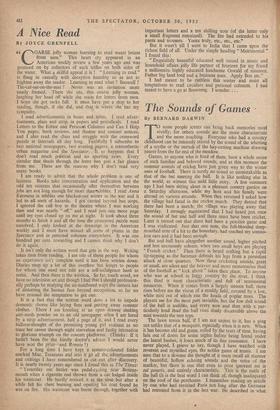The Sounds of Games
By BERNARD DARWIN O some people scents can bring back memories most vividly; for others sounds are the more characteristic and the more touching. Everyone who had a country childhood can be intensely stirred by the sound of the whetting of a scythe or the onrush of the hay-cutting machine drawing nearer from the far end of the meadow.
Games, to anyone who is fond of them, have a whole series of such familiar and beloved sounds, and at this moment the summer sounds of cricket have just given way to the winter ones of football. There is surely no sound so unmistakable as that of the bat meeting the ball. It is like nothing else in the world, as witness this mild little story. A few summers ago I had been sitting alone in a pleasant country garden on a Saturday afternoon, while my host and • his family were abroad on various errands. When they returned I asked how the village had fared in the cricket match. They denied that there had been a match; the village was playing away that Saturday. I strongly maintained that I had heard just once the sound of bat and ball and there must have been cricket. Later it turned out that there had been a practice game and I was vindicated. Just that one note, the full-blooded deep- mouthed note of a hit to the boundary, had reached my somno- lent ears and it had been enough.
Bat and ball have altogether another sound, higher pitched and less unctuously solemn, when two small boys are playing " French cricket." Then there is heard nothing but a rapid tip-tapping as the batsman defends his legs from a persistent attack at close quarters. Now these cricketing sounds, great or small, are silent and the heavier and more monotonous thud of the football at " kick about " takes their place. To anyone who was at school in foggy country by the river, I think this thud is most characteristic and full of sentimental memories. When it comes from a largely unseen ball, there rises before me the vision of a muddy field, covered by a low, white mist out of which rise the heads of poplar trees. The players are for the most part invisible, but the low dull sound of the ball is audible, and every now and then with a par- ticularly loud thud the ball rises dimly discernible above the mist towards the tree tops. The lawn tennis ball, if I am not unjust to it, has a ping not unlike that of a mosquito, especially when it is new. When it has become old and green, soiled by the tears of time, having lain out of doors for some nights before being found under the laurel bushes, it loses much of its fine resonance. I have never played. I giieve to 'say, though I have watched with reverent and mystified eyes, the nobler game of tennis. I am sure that to a devotee the thought of it must recall all manner of beautiful, hollow echoing sounds and the voice of the marker, but there is one that even to poor ignorant me is sub generis, and entirely characteristic. This is the rattle of the ball (it is the best word I can think of, though inadequate) on the roof of the penthouse. I remember reading an article by one who had revisited Paris not long after the Germans had retreated from it in the last war. He described in what an agony be had approached the tennis court, not knowing whether it had been ruined and despoiled by the invaders. Then he heard that familiar sound of a game in progress and could murmur a nunc dimittis: all was well.
Billiard balls have a pleasant clean-cut click, eminently characteristic. It is to me, however, a faintly sinister and immoral sound, because I read Frank Fairleigh in extreme youth, almost before I had ever seen a billiard table. Those who know that heavenly work will remember how it was spoken of in a whisper as " the board of green cloth " and how the melodramatic villain, Cumberland, robbed the virtuous Harry Oaklands. Like the sound of bat and ball, that of billiards is wholly unmistakable. Whether those who watch it regularly can tell the tone of, let us say, the illustrious Joe. Davis hitting a ball from anyone else I do not know, but I have sometimes thought—I have never been put to the proof—that I should know the sound of certain eminent drivers of a golf ball with my eyes blindfolded. Mr. Roger Wethered's drives seem like pistol shots.
Golf, with which I am naturally the most familiar, may ,almost be said to have had two sets of sounds, within living memory, since the gutty ball, which vanished in 1902, had a far more acute and resonant note that the usurping rubber core. The ball rang out beautifully off an iron club and a putt properly struck off a putting cleek had a lovely song of its own. I have a feeling even now that Freddie Tait's lofted sleek sang louder and clearer than did anyone else's. And what a horrid, ugly, dull sound one's own cleek made on the days when one's putts, feebly struck, died away to the right of the hole. The rubber-core is not without a pleasant music of its own, but it is not comparable with the gutty's. " Crack after crack- rings clearly as every ounce of their youthful muscle is thrown into the blow." That sentence of Mr. Horace Hutchinson's, which 'I used in boyhood to murmur ecstatically to myself, was written of the gutty.
Another new sound which has come with the changes in golf is the metallic clangour of steel shafts in a bag. It arises to a notable degree when one's small caddie has loitered behind and one has addressed to him a sharp reprimand. Then the overburdened little brat comes bumping along, the shafts banging against one another. At least that used to happen in the days of boy caddies. I have not noticed it in the carts and trolleys in which the impoverished golfer must today pull his own clubs. Yet another new sound is the melancholy piping of the wind through the shafts of the shooting sticks, on which all golfers now majestically repose. I remember once to have been seriously disturbed by that eerie sound at a most crucial moment, but wild horses shall not extract from me the name of the innocent criminal. I might have missed the shot anyhow.



































 Previous page
Previous page